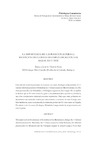Identificador persistente para citar o vincular este elemento:
http://hdl.handle.net/10553/15722
| Campo DC | Valor | idioma |
|---|---|---|
| dc.contributor.author | Traver Vera, Ángel Jacinto | en_US |
| dc.date.accessioned | 2016-02-11T03:30:57Z | - |
| dc.date.accessioned | 2018-03-15T14:36:16Z | - |
| dc.date.available | 2016-02-11T03:30:57Z | - |
| dc.date.available | 2018-03-15T14:36:16Z | - |
| dc.date.issued | 2014 | en_US |
| dc.identifier.issn | 2386-8635 | en_US |
| dc.identifier.uri | http://hdl.handle.net/10553/15722 | - |
| dc.description.abstract | Este artículo rastrea la presencia de Lucrecio en cuatro florilegios renacentistas: el Viridarium illustrium poetarum de Mirándula, los Virtutum encomia de Henri Estienne, los Illustrium poetarum flores de Mirándula y el Florilegium magnum de José Langio. De su análisis se deduce que el De rerum natura fue, pese a sus planteamientos epicúreos y heréticos, una obra comúnmente extractada en estos repertorios. Dado ue estas polianteas renacentistas eran manuales usados por universitarios y escritores de toda Europa, también facilitaron, como se demuestra, la imitación poética del De rerum natura en España. | es |
| dc.description.abstract | This paper surveys the presence of Lucretius in four Renaissance florilegia: the Viridarium illustrium poetarum by Mirandula, the Virtutum encomia by Henri Estienne, the Illustrium poetarum flores by Mirandula and the Florilegium magnum by Joseph Langius.From their study we deduce that the De rerum natura, despite its Epicurean and heretical premises, was a work often extracted in these poetic collecti ns. These Renaissance polyanthea were handbooks much used by university students and writers from all over Europe. As this article will show, these polyanthea paved the way for the poetic imitation of the De rerum natura in Spain. | en |
| dc.format | application/pdf | es |
| dc.language | spa | en_US |
| dc.relation.ispartof | Philologica canariensia | en_US |
| dc.source | Philologica Canariensia. Las Palmas de Gran Canaria: Facultad de Filología de la Universidad de Las Palmas de Gran Canaria, 1994-. e-ISSN 2386-8635. n. 20 (2014) | en_US |
| dc.subject | 550510 Filología | es |
| dc.subject | 570107 Lengua y literatura | es |
| dc.title | La importancia de las polianteas para la recepción de Lucrecio en España durante los siglos XVI y XVII | en_US |
| dc.type | info:eu-repo/semantics/article | en_US |
| dc.type | Article | en_US |
| dc.compliance.driver | 1 | es |
| dc.identifier.absysnet | 234349 | es |
| dc.identifier.crisid | - | - |
| dc.identifier.eissn | 2386-8635 | - |
| dc.investigacion | Artes y Humanidades | es |
| dc.rights.accessrights | info:eu-repo/semantics/openAccess | es |
| dc.type2 | Artículo | en_US |
| dc.identifier.ulpgc | Sí | es |
| dc.description.esci | ESCI | |
| dc.description.erihplus | ERIH PLUS | |
| item.fulltext | Con texto completo | - |
| item.grantfulltext | open | - |
| Colección: | Philol. Canar. n.020, 2014 Artículos | |
Los elementos en ULPGC accedaCRIS están protegidos por derechos de autor con todos los derechos reservados, a menos que se indique lo contrario.
